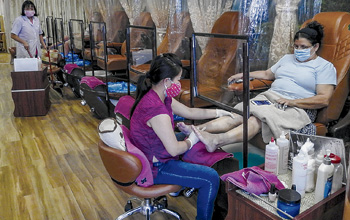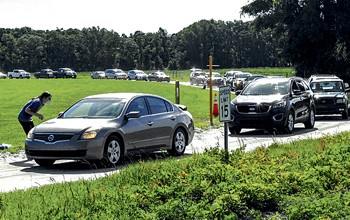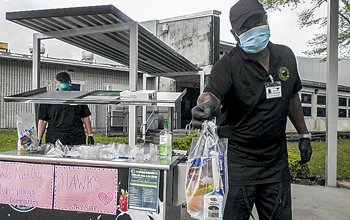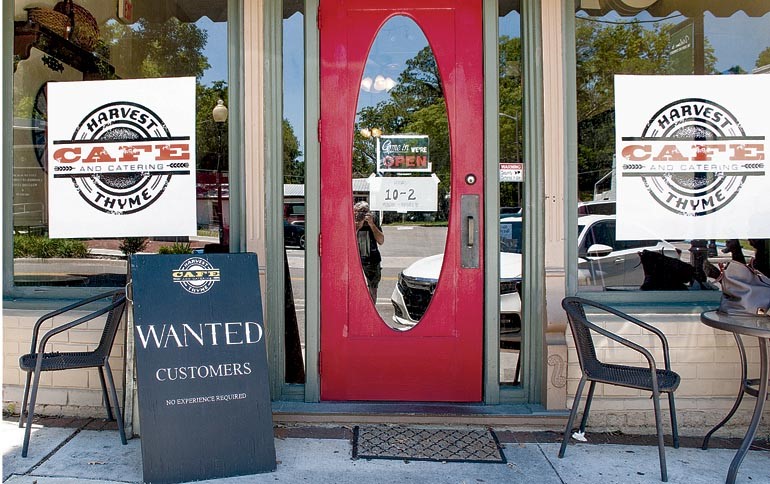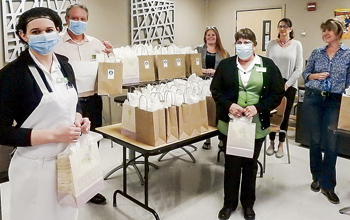ALACHUA – In the last two weeks, Florida Governor DeSantis has relaxed stay-at-home and business restrictions in an effort to get the state economy back on track and put people back to work. Under recommendations form the CDC, the reopening is on a three-phase schedule, a framework which outline goals of each phase before moving on to the next.
The first phase allows retail outlets and restaurants to operate with indoor capacity at 25 percent. The first phase also lets medical facilities begin providing elective surgeries. Sporting events can resume without spectators. All of the openings are based on people observing social-distancing recommendations and use of face masks. DeSantis stated that face masks should be standard, but people who don’t wear them won’t be fined. As previously announced, schools will remain out of session, with online “distance learning” in place, and visits to nursing homes still will be prohibited.
Over 30 states are beginning to reopen, yet none have met the goal of 14 days of declining cases that was supposed to be the benchmark to start Phase 1. The COVID-19 pandemic is still growing, and opening up businesses and removing social distancing could cause a resurgence in the infection rate. At the same time, many people have been out of work for over a month and what savings they had are running out. Especially for local, small retail, restaurants and bars, the ability to last until they can reopen is critical. Much of whether the reopening will succeed without will depend heavily on people following the guidelines.
For store owners, following guidelines is a matter of good business practices. Many businesses have signs stating that masks are mandatory to enter. “The business owners get it,” said Kelly Harris, owner of Kelly’s Kreations in Alachua, a shop that is an eclectic mix of gift items and a floral shop.
“This virus is a serious health problem and we want our customers to feel safe to visit and protect ourselves as well,” said Harris. “I have hand sanitizer at the door, require a face mask to enter and maintain a six-foot distance. This a small effort to keep our customer safe.”
Like many other small business owners, Harris had to retool her business model to meet the crisis. “I decided to do daily Facebook posts with lessons or funny material for people to view. It also served to keep attention on my business and help promote other Main Street businesses and restaurants. I called it ‘Making Lemonade’ because when life hands you lemons like the current crisis, you find the positive way to deal with it,” said Harris.
Harris says that the podcast took off and has viewers from throughout the U.S. and Canada. It became a game and people contributed to it and sent her gifts with lemons, including a mask, tea, and cookies as well as other things. The podcast has helped keep people aware of her business.
“I was really glad they allowed us to open just before Mother’s Day,” said Harris. “I had just about depleted my emergency funds, and luckily, I had a huge response to Mother’s Day for flowers. It's great to be in business again.” She now plans to have a larger online presence and hopes to continue the ‘Making Lemonade’ podcast.
For some, the situation was even more dire the longer the shutdown continued. Stephanie Fletcher and her mom had opened The Happy Place, an ice cream/coffee parlor and gift shop two weeks before the shutdown occurred. They had invested a lot to get the shop decorated and functional, but had no opportunity to make it back. Now they are reopened and hoping to get business. Several of the store owners along Alachua’s Main Street said that people were still cautious about the conditions, and there are fewer visitors so far.
Business owners in High Springs were also finding inventive ways to survive when the stores were closed. Tina Lanza of Lanza Gallery and Art Supplies was also closed for six weeks as a non-essential business. For Lanza, the internet was also her business lifeline and effective marketing tool. “I really pumped it out in online marketing. Offering curbside pickup or delivery, people could order online and receive advice for their art needs,” Lanza said. “I also made daily use of my Facebook page to keep people aware of the business.”
Lanza is currently creating an online store that people can order from as it’s convenient for customers and Lanza believes it is a preparation for any future resurgence. “I also started selling handmade cloth masks and offered free paper masks with a $25 purchase,” she said. Like the others, Lanza is strict on safety measure for the store. At the front door sits a table with hand sanitizer to use before entering and a sign requiring masks. “We have to just do what we have to do in these times. Safety matters,” Lanza said.
One unexpected oddity is the pawn shop business. It would be expected that with so many people out of a job that people would be pawning items for cash. But according to several local pawn shops, it is the opposite. People paid off their items in pawn and took them back. They also purchased other items. In Santa Fe Pawn in High Springs they were having trouble getting enough items in their inventory for display.
On Monday, barber shops and beauty salons were allowed to open. At Lovely Nails on Main Street in High Springs they also wear gloves and have splash shields between the manicurist and customer. Down the street, Decades on Main was opening for the first day since being forced to close over a month ago. Barbara Devino was helping a customer pick out some items, with both of them wearing masks. At the counter a small table separated the customer and Devino. On the table was the eve-present hand sanitizer and a credit card machine, which was the only payment method to maintain distance. After a customer used the machine it was wiped down before the next person. “We do what we have to, to maintain safety for everyone. It’s minor and a small step to be back to working,” Devino said. “It feels great to be able to work again.”
# # #
Email rcarson@
alachuatoday.com
Add a comment

